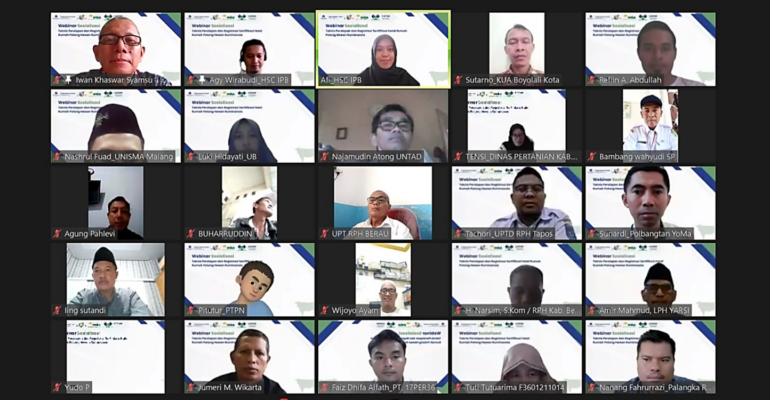HSC IPB University Holds Socialization on the Importance of Halal Certification for Ruminant Slaughterhouses

The Halal Science Center (HSC) or IPB University Halal Science Center held a Webinar via zoom meeting on Wednesday, 3/4. This webinar activity is a collaboration between HSC IPB University and Meat & Livestock Australia (MLA) which carries the topic “Technical Socialization of Preparation and Registration for Halal Certification of Ruminant Slaughterhouses”.
This webinar activity was opened by Prof Khaswar Syamsu, as Chairman of HSC IPB University. In his speech, he said that slaughterhouses (RPH) are the first link in the halal supply chain for meat products and their derivatives.
“Whether meat products and processed products are halal or haram does not only depend on the type of animal but also on the method of slaughter. “So with this webinar, it is hoped that slaughterhouse business actors will understand the regulations and procedures for halal certification in Indonesia and immediately carry out the certification process before October 17th, 2024,” said Prof Khaswar.
The material for this webinar was delivered by Research Associate HSC IPB University, Agy Wirabudi Pranata. He said that starting October 17th, 2024, both food and beverage products, including slaughter products and slaughter services circulating in Indonesia, must be certified halal.
“The urgency of halal certification in slaughterhouses is important because meat products and their processed products are widely used in various business scopes, from restaurants, catering, to packaged products, so the slaughtering process is one of the critical points in halal certification,” he said.
Agy explained further regarding the technical preparation for halal certification which includes preparation of Human Resources (HR), documents and facilities at the slaughterhouse.
“The slaughterhouse must have a halal management team which at least includes a halal supervisor and a halal slaughterer who is trained or competent as well as a stunner when using stunning in the slaughtering process and also a veterinarian or paramedic,” he said.
Next, Agy explained the implementation in the RPH which includes facilities and infrastructure which must refer to the Indonesian National Standards (SNI) and the Halal Product Guarantee System (SJPH) as well as recording all critical points in the RPH.
“The origin of livestock, the pre-slaughter process, slaughtering, post-slaughtering, waste handling and meat handling and transportation are critical points in the RPH which will be part of the implementation and internal audit of the RPH,” he said.
Agy explained the stages of halal certification registration, namely creating an account, uploading required documents, auditing by the halal inspection agency (LPH), fatwa hearing by the fatwa commission and issuance of halal certificates by the Halal Product Guarantee Agency (BPJPH).
“The audit was carried out to assess the suitability of the RPH in meeting SJPH standards and applicable regulations, the assessment was carried out on the documents and their implementation and the results were sent to the fatwa commission,” said Agy. (*/Lp) (IAAS/ASD)



